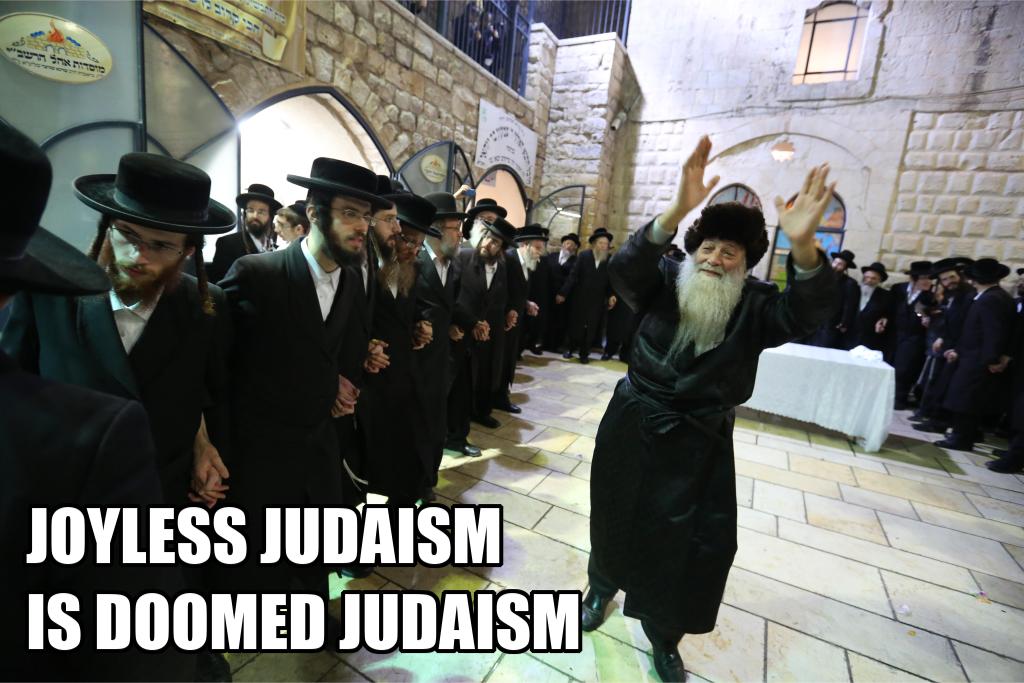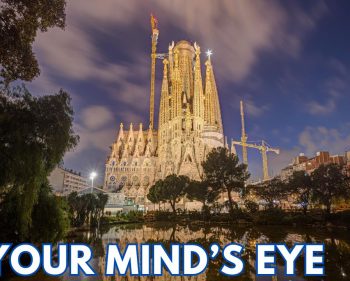JOYLESS JUDAISM IS DOOMED JUDAISM

Parshat Ki Tavo has one of the most harrowing sections in the entire Torah — the klalot, the curses. A long, detailed, terrifying list of everything that could go wrong for the Jewish people if they stray from God’s path. Sickness, famine, war, exile, despair — it’s a dark, relentless passage, very hard to read and absorb.
Actually, if you follow the flow of these verses — if you listen closely to the rhythm, the rise and fall, the sequence — you begin to see something remarkable. It’s not just a scary list. It’s our story. It’s the story of the Jewish people.
Every dreadful prediction by Moshe — we’ve lived it. If you look at Ki Tavo, you see the destruction of the First and Second Temples. You see the Bar Kochba revolt. You see the persecutions that we mourn every year on Tisha B’Av.
Then came the Crusades — whole Jewish communities in the Rhineland were wiped out. Then the expulsions from England, France, Spain, and Germany — over and over again, we were thrown out, stripped of everything, persecuted, killed.
We had the horrors of Chmielnitzki in the 1600s. Pogroms throughout the Russian Empire in the 18th and 19th centuries — Odessa, Kishinev — rivers of blood. Massacres during the First World War – forgotten today, but at the time, they were the worst massacres in modern memory. Tens of thousands killed in Poland, Ukraine, Belarus — communities totally destroyed.
Jews under Muslim rule were no better off. I have a book by the British consul in Jerusalem in the nineteenth century during Ottoman rule: Stirring Times, Or: Records from Jerusalem Consular Chronicles, 1853 to 1856. It tells the story of the corruption of the Ottomans in that timeframe, but more importantly, for our purposes, the story of the Jews in Ottoman Palestine. And let me tell you this: The Jews in the Ottoman Empire weren’t second class citizens, they were third class citizens – or worse.
Then came the Holocaust. Read the pesukim in Ki Tavo. It’s like a Holocaust textbook.
And now, in our time — the rising tide of Islamic extremism. Terror attacks. Massacres. Murders. And above all, a sickening obsession with wiping Israel off the map.
All of it, as spelled out in Ki Tavo, has happened to us at some point — the sickness, the starvation, the rape, the exile, the humiliation, the dispossession — all of it is there. Moshe Rabbeinu laid it all out over 3,000 years ago.
And we’re also told why it’s going to happen. The Torah gives us the reasons. Much of it makes sense. We don’t follow God’s commands. We turn away from God. We are immoral. We act cruelly to one another. We become arrogant. We betray our values.
But then comes a verse that seems — on the face of it — bizarre (Deut. 28:47): תַּחַת אֲשֶׁר לֹא עָבַדְתָּ אֶת ה’ אֱלֹקֶיךָ בְּשִׂמְחָה וּבְטוּב לֵבָב – “Because you didn’t serve Hashem your God with joy and gladness of heart.”
That’s the reason bad things happen? Really? Because we weren’t happy enough?
Are we meant to believe that people keep mitzvot, they daven, they do everything they are supposed to — but because they weren’t smiling while doing it, that’s why the world fell apart?
Come on. That sounds absurd. Are we not allowed to be sad sometimes? Life is hard! Things go wrong! Surely God understands that.
So here’s the thing — and this is important.
Moshe isn’t saying that a lack of joy causes punishment. He’s not saying God gets angry because you didn’t sing loud enough during Hallel. No. Moshe is warning us about something far more profound. Something deeply human:
If you fall into the trap of practicing Judaism without joy, even if you do everything right, you’re already in danger. You’re doomed — not because of divine anger, but because that’s how the human condition works.
If Judaism becomes a burden… if mitzvot feel like chores… if Jewish life is dry, heavy, joyless — you can’t sustain it. Not for long. And your children won’t want to inherit it.
That’s not a punishment. It’s a consequence.
Tachat asher lo avadeta et Hashem b’simcha isn’t just a poetic flourish. It’s a psychological truth.
There’s a wonderful man in our community who’s a pain specialist. He treats people with chronic pain — terrible, debilitating conditions. And there are other doctors at the shul who do everything in their power to cure people of their sicknesses, whatever they may be. They use every tool modern medicine has to offer: surgery, medication, therapy.
But do you know what this doctor told me? He said that the biggest predictor of healing — more than any drug or procedure — is your mental attitude.
If a patient believes they can get better, if they find hope, meaning, purpose — their chances of recovery skyrocket. Of course you also need the medication or the surgery or the therapy, but without the positive attitude – even the best medicine or treatment will struggle to succeed.
If a patient descends into despair, if they feel hopeless — even the best medical care can’t save them. The body follows the spirit.
Someone once asked Rav Moshe Feinstein zt”l a very pertinent question.
They said, “Rabbi, back in the late 1800s and early 1900s, Jewish immigrants came to America. They were poor, but many of them were Shomer Shabbat — they kept Shabbat even if it meant losing their jobs. But many of their kids left Judaism. Some married out. Why did that happen?”
And Rav Moshe smiled.
He said: “It’s simple. Every Friday, these men came home having lost another job because they wouldn’t work on Shabbos. And they sat at the table and said, ‘Oy, es iz shver tzu zayn a Yid — it’s hard to be a Jew.’
They were miserable. Understandably! But that’s what their kids saw: Judaism equals misery.
So when the kids grew up, they said: ‘Why would I sign up for this? Why would I make my life harder?’
But some men — a minority — came home and said: ‘Baruch Hashem I have Shabbat! I lost my job, yes – but I have something priceless.’
And their homes were filled with zmirot, with joy, with laughter. And their kids saw: Shabbat is beautiful. Judaism is uplifting.
Guess which kids stayed the course?
And now you understand Moshe’s warning:
Tachat asher lo avadeta et Hashem b’simcha — Not because you didn’t do the mitzvot, but because you did them with a heavy heart. It’s not that you will be punished — but because joyless Judaism is not sustainable, your future is doomed.
It’s not enough to do mitzvos. We have to love doing mitzvos. We have to infuse them with meaning, with passion, with music, with color, and with warmth. That’s what keeps Judaism alive. That’s what keeps us alive.
So let me say this clearly:
Do you know why we’re still here — after every exile, after every pogrom, after every attempt to destroy us and wipe us out?
Because we kept going — with simcha and tuv leivav.
We danced at Simchat Torah in the Warsaw Ghetto, and we dance at Simchat Torah after October 7th.
We sang zmirot in Siberian labor camps, and we sing zmirot even when we hear about a terrorist attack and another soldier wounded or killed.
You can throw anything at us. You can hate us, you can expel us, you can bomb us, you can boycott us. Do your worst! But you will never destroy our simcha.
And maybe, just maybe, that joy — that unbreakable spirit — is the very thing that will one day bring an end to the klalot, and usher in the brachot, the blessings, that Moshe promises just before them.
Because that’s the real secret: Joy doesn’t just survive. Joy wins.

